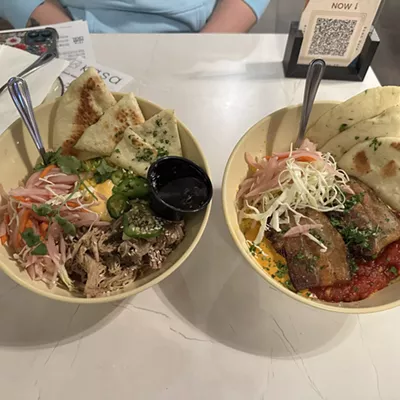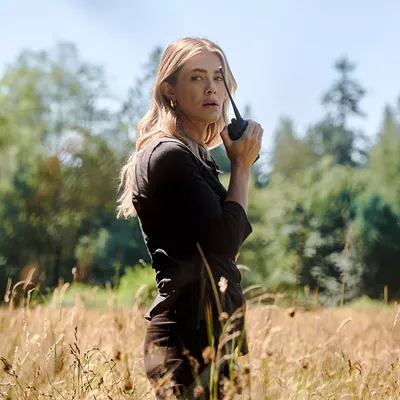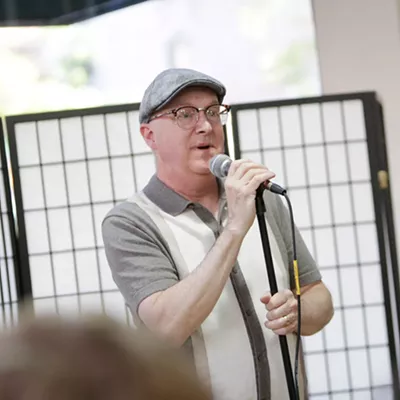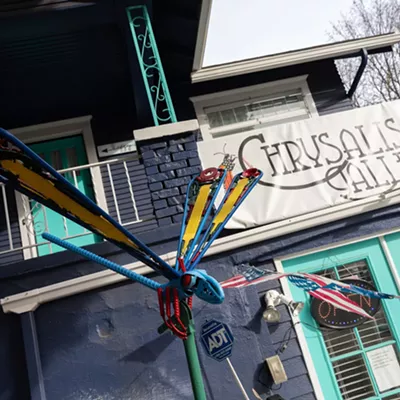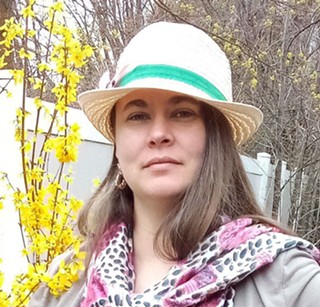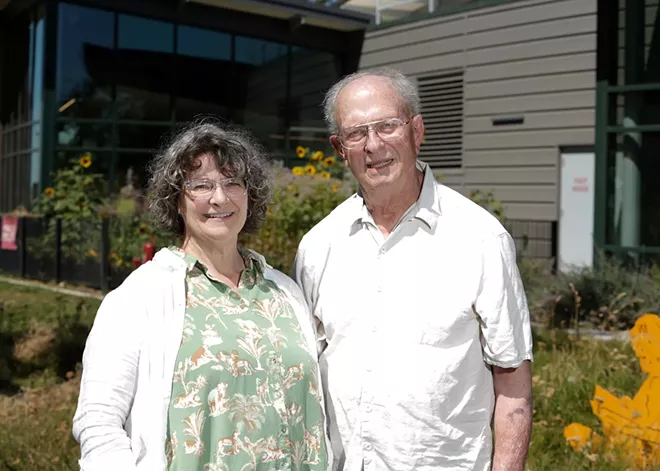
Stories are powerful. In many ways, they allow us to slip behind someone else's eyes and see a glimpse of their thoughts, emotions and experience. This shared perspective can forever alter how we view the world and those around us.
And everyone has a singular story to tell, including the small group behind the Finding Human Project. The Spokane-based nonprofit offers anyone a safe space to share their experiences and connect more deeply with others through storytelling, live theater and self-improvement workshops.
"I had the epiphany that story makes a difference and connects us. I fell in love with storytelling arts and acting," says Diana Carson-Walker, the group's co-founder and artistic director.
She and her husband, Sandy Brown, initially hoped to start their storytelling-driven nonprofit in England, but the COVID pandemic and their visas' expiration scrapped the idea. So after moving to Spokane in 2022, they launched the Finding Human Project with the help of Carson-Walker's friend, Kaileigh Hubbard, who brings past experience working for nonprofits and is now its CEO.
"There's this continued divide in our communities of isolation that we're noticing, especially after COVID and with the increase in technology," Hubbard says. "There's this growing lack of third spaces that bring people together to connect."
The newest program the trio developed to help bridge this divide are called story circles, "a modern spin on what people have done forever of sitting around and telling stories," Carson-Walker says.
Participants from different backgrounds gather in small groups of six to eight. A facilitator asks the circle to respond to a prompt, like "tell us about a time when you were really proud of your community."
"It gets people into telling personal stories, instead of taking a stand on a soapbox," Carson-Walker says. "[They] tell us a story of impact, and it creates a connection and it flows around the circle."
Each participant has a chance to respond but doesn't know when their turn will be, which keeps responses more spontaneous. Toward the end of a session, the circle reflects on the group's overall narrative and is guided into weaving together a shared story reflecting it.
The Finding Human Project's founders are working on setting up more story circle events at local libraries on a regular basis, and they hope to begin in the fall. They've led five story circles so far, and while the events weren't initially envisioned as being part of the nonprofit's regular programming, the team decided to offer more due to past participants' enthusiasm.
Carson-Walker also foresees conducting story circles for special occasions, for a fee.
"We'd love to offer it to families, like for grandma's 70th birthday," she says.
The Finding Human Project's own story began while Carson-Walker was working for the Natural Resources Conservation Service in California about a decade ago. In her role there, she worked with farmers on water conservation. The job was often disheartening.
"We weren't making any real change," she recalls. "If the agency disappeared, all of the changes would reverse instantly."
As her frustration with the situation was mounting, Carson-Walker experienced a moment of revelation. One day she encountered a farmer who, unlike the others she'd met with, was suddenly eager to implement water conservation practices. She wondered why things were different this time.
It was because the farmer took time to listen to someone else's story.
"Story brings us into a level that we understand and can sympathize, empathize, or just experience it," she says. "We get swept into this story, and we identify with it instead of just being lectured at."
Simultaneously, Carson-Walker was becoming more interested in the art of theater. Another revelatory moment hit when she read an interview with her favorite actor, David Tennant.
"[He] said, 'I just get to play and tell stories for a living,' and my brain exploded," she says.
Soon after, in 2018, Carson-Walker and her husband decided to study theater at Coventry University in England.
"I had this idea of how therapeutic it was to tell and hear each other's stories," Carson-Walker says of her studies. "It felt like something was really missing in our culture."
Besides story circles, the Finding Human Project is also preparing to debut an original play, called Hope in River City. It tells the story of Camp Hope, the large, now-defunct homeless encampment adjacent to Interstate 90 in East Spokane that at its peak in summer 2022 counted 600 people within a one-block border.
"This is a story that needs to be told," says Brown, who was inspired to create the play as he watched Camp Hope's story unfold in the local news and from seeing it firsthand.
"I had this idea of how therapeutic it was to tell and hear each other's stories. It felt like something was really missing in our culture."
The public's reaction to Camp Hope, which was vacated in June 2023, "was biased from the beginning," Brown says. "Some people thought, 'Gotta get these homeless people off the street and into a place where they can't be seen.' And the other side was, 'We want people to see the homeless and actually have some sort of empathy with them and understand that this is a complicated situation.'"
Brown collected stories of Camp Hope's former residents from the media, by interviewing people working there like Julie Garcia of Jewels Helping Hands, and conducting story circles with nearby housed neighbors in order to show a complete picture of the camp's impact.
"It's very traumatic for the community," Brown says. "It was a horrible situation, and I don't know anybody who wanted to pretend otherwise."
People working in the camp, he says, wanted "people [to] see the homeless for who they are, a complex river of people who have experienced trauma in their own lives, and just see them as people."
For now, the play's production is being funded by the Finding Human Project's three co-founders, though they've applied for grants.
"We're doing this as a labor of love," Brown says. "We might hear that we get some funding, but [either way] we're gonna keep going."
Hope in River City is set to premiere the first weekend of November at Stage Left Theater in downtown Spokane.
"That's what we all want, really, to be seen, and that's why stories are so important," Brown says.
In addition to the play and its story circles, the Finding Human Project is developing theater workshops to be offered on a sliding fee scale. Sessions in the works like "Taming the Inner Bully" tackles not holding yourself back, while "Rehearsing Compassionate Response" prompts people to reevaluate a time they didn't handle something well.
"We tell stories all the time," Carson-Walker says. "Doing it with more intent and compassion, I believe, has the power to make good connections and [make] big changes in the world." ♦
Learn more at findinghumanproject.org.





